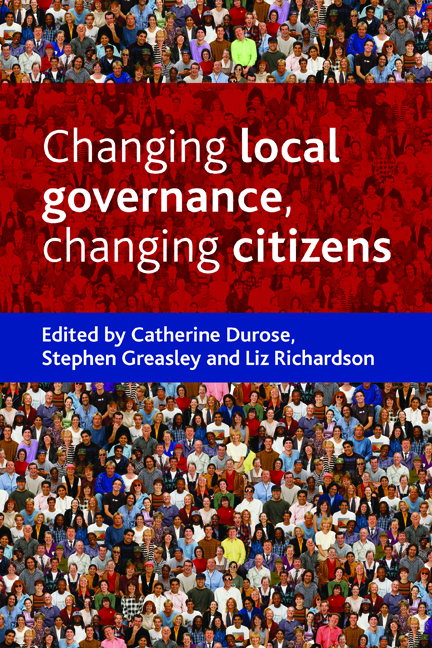Book contents
- Frontmatter
- Dedication
- Contents
- List of boxes and tables
- Acronyms
- Notes on contributors
- Acknowledgments
- Foreword
- Preface
- one Changing local governance, changing citizens: introduction
- two Citizen governance: where it came from, where it’s going
- three ‘Neighbourhood’: a site for policy action, governance … and empowerment?
- four Urban housing market restructuring and the recasting of neighbourhood governance and community
- five Citizen aspirations: women, ethnicity and housing
- six Can we promote cohesion through contact? Intergroup contact and the development of community cohesion
- seven New migrants, citizenship and local governance: ‘Poles’ apart?
- eight Citizens of faith in governance: opportunities, rationales and challenges
- nine Citizens’ reflections on behaviour change policies
- ten Every child’s voice matters?
- eleven e-citizenship: reconstructing the public online
- twelve Conclusion
- Index
one - Changing local governance, changing citizens: introduction
Published online by Cambridge University Press: 16 July 2022
- Frontmatter
- Dedication
- Contents
- List of boxes and tables
- Acronyms
- Notes on contributors
- Acknowledgments
- Foreword
- Preface
- one Changing local governance, changing citizens: introduction
- two Citizen governance: where it came from, where it’s going
- three ‘Neighbourhood’: a site for policy action, governance … and empowerment?
- four Urban housing market restructuring and the recasting of neighbourhood governance and community
- five Citizen aspirations: women, ethnicity and housing
- six Can we promote cohesion through contact? Intergroup contact and the development of community cohesion
- seven New migrants, citizenship and local governance: ‘Poles’ apart?
- eight Citizens of faith in governance: opportunities, rationales and challenges
- nine Citizens’ reflections on behaviour change policies
- ten Every child’s voice matters?
- eleven e-citizenship: reconstructing the public online
- twelve Conclusion
- Index
Summary
Introduction
Renegotiating the roles of citizens and their relationships to public governance have been policy preoccupations of New Labour during its period in office. As Clarke (2005: 447) observes: ‘at different points, citizens have been activated, empowered, and made the subjects of responsibilities as well as rights’. This is not just a New Labour fixation; Cameron's Conservatives have also been interested in the limits of state action and the scope of personal responsibility. Changing local governance, changing citizens brings together recent empirical analyses of this renegotiation in a variety of contexts.
The recent efforts to remodel the citizen–governance relation are part of a long running and evolving agenda (John, this volume). Some of the trends that are contributing to change are long-term – an increasingly diverse and demanding public, the continuing globalisation of the economy and a fracturing of the institutional landscape. Yet, despite the continuities, we would argue that over the last decade policy efforts appear to have intensified and developed a particular character. Across the ideological spectrum, what citizens expect of governance and what governance can expect of citizens are up for grabs.
The chapters in this book all focus empirically on aspects of the attempted renegotiation between public governance and citizens. Inevitably, given the variety of contexts considered, a single consistent picture of changing citizenship fails to appear. Nonetheless, strong connections exist between the various areas discussed, similar questions can be posed and similar pressures are at play. The purposes of this introductory chapter are to briefly situate the subsequent contributions in relation to some key concepts and describe the gap that we believe the book fills.
Changing language, changing practice?
If the language used to talk about public services, governance and citizens is anything to go by there has already been a revolution in the way the state engages with citizens. Communities and citizens are to be empowered as co-producers of public value. Communities must be cohesive, while children and new migrants are understood as almost, but not quite, full citizens. However, the practice sometimes lags behind the language and sometimes our language and concepts do not keep up with changing practice.
- Type
- Chapter
- Information
- Changing Local Governance, Changing Citizens , pp. 1 - 12Publisher: Bristol University PressPrint publication year: 2009



